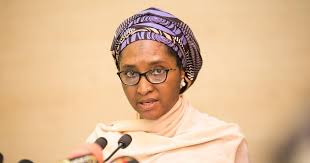The Federal Government will remove fuel subsidies in July 2022, according to Mrs. Zainab Ahmed, Minister of Finance, Budget, and National Planning.
Ahmed made the announcement at a press conference on Tuesday night, immediately after the conclusion of the 27th Nigerian Economic Summit (NES#27) in Abuja.
The rules of the Petroluem Industry Act (PIA) indicate that all petroleum products should be deregulated, she explained.
She stated that, in accordance with the PIA, the Federal Government would no longer be responsible for gasoline subsidy costs from July 2022, the 12-month period following the passing of the Petroleum Industry Bill into law.
Fielding questions from newsmen, Ahmed said: “On the issue of fuel subsidy, the PIA has been passed and the provisions on the PIA indicate that all petroluem products should be deregulated.
“But also, when the PIA was passed, there was a -12 month implementation time-line that was provided.
“So, we are looking at it arleady, three months have passed.
“So, when we were preparing 2022 budget, we made the assumption that the time of PIA started from July 2021.
“And because of the fuel subsidy, we did not have provision in 2020/ 2021, though we have been incurring the costs anyway, we decided to make provision from January to June 2022 in the proposed budget, that is to say that we expect from July 2022, we will not be incurring the cost of fuel subsidy. I hope, that is clear.”
Recalled that the former Emir of Kano, Alhaji Muhammad Sanusi II, has said the Federal Government is indulging in illegality by paying petroleum subsidy from the federation account.
The former Central Bank of Nigeria (CBN) governor who spoke virtually as one of the panelists on Sustainable Development Goals (SDGs) during the Summit, said the Nigerian daily oil consumption data is suspect, thus there is endemic corruption in fuel subsidy payments.
He therefore, advocated the end of fuel subsidy and electricity subsidy, saying the money saved should be invested in critical sectors like education and health, adding that the long-term gains far outweigh the short-term pains.
On the implementation of the Presidential Committee on Restructuring and Rationalisation of Federal Government Parastatals, Commissions and Agencies, under the Chairmanship of Mr. Steve Oronsaye, popularly called, Oronsaye Report, Ahmed explained that another Sub-committee has been set up by the present administration to take a holistic review of the Report, with a view to implementing it.
She said unless and until the Oronsaye Report is implemented, the agencies recommended for scrapping or merging, would continue to receive their budgetary allocations.
She said that the sub-committee has gone far with the Report as the mandate of the committee is very difficult, adding that the Committee is doing a holistic review of Oronsaye Report and earnings across all MDAs to ensure equity.
On Nigeria’s borrowing, Ahmed said Nigeria has been consistent in paying both the domestic and foreign debts.
She added that because of the Nigeria’s consistency in servicing her debts, that the the lenders continue to oblige her whenever the country wants to borrow.
She noted that Nigeria has debt management strategy that guides how it borrows funds, as the borrowing is carefully planned and calibrated to meet the debt service obligations of the lenders
On the impact of the money so far borrowed, Ahmed said the infrastructure built with funds borrowed has been impactful, as it has improved the quality of life of the citizenry.
Also speaking during the media briefing, Mr. Asue Ighodalo, Chairman of NESG, said the recommendations of the.annual Summit, over the past 26 years, have been incorporated into government policies.
While expressing some reservations on the Implementation of the past Summit recommendations, he said: “we are not as happy as we should be looking at the trajectory of development in the country.”
He said each administration comes to power with its party manifesto, adding that NESG being a private sector- led think-tank and advocacy group, looks at the manifesto and advises government on what to do to improve the quality of life of the citizenry.
“Over the years, we feel fairly satisfied that most of the recommendations of the Summit which government has adopted, have been very impactful.
“They include pensions reform, telecoms reform, power reform. We suggested them and government looked at them and adopted them as policies.
“We will continue to do this, even where people think that we have not achieved as much as we should.
“But we feel very satisfied that in this partnership with the government, it is working hand in hand with us throughout the year not just at the Summit.”

